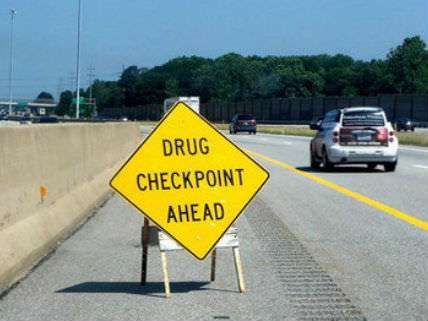The Fake Drug Checkpoint May Be Legal, But That Does Not Mean the Traffic Stops Are

Yesterday I noted that police in Mayfield Heights, Ohio, a Cleveland suburb, have been using signs announcing nonexistent drug checkpoints to scare drivers into evasive action that the cops cite to justify traffic stops. The Cleveland Plain Dealer reported that "experts say…the fake checkpoints are legal." But according to several federal appeals court decisions, the stops may not be, depending on how much evidence police have in addition to the apparent evasion of a phony checkpoint.
In the 2002 case United States v. Yousif, the U.S. Court of Appeals for the 8th Circuit deemed unconstitutional a Missouri Highway Patrol scheme that involved stopping every car taking the next exit after signs announcing a drug checkpoint on Interstate 44. Since all cars taking the exit were stopped, the Eighth Circuit viewed this fake drug checkpoint as little different from the real drug checkpoint rejected by the Supreme Court in the 2000 case City of Indianapolis v. Edmond.
The Eighth Circuit considered a modified version of the Missouri Highway Patrol operation in the 2006 case United States v. Carpenter. Instead of stopping every car using the exit after the checkpoint signs, troopers followed nonlocal cars, looking for reasons to stop them. The defendant in that case, who was driving a car with out-of-state plates, made a U-turn and pulled onto the side of the road after seeing the patrol car. The Eighth Circuit said that maneuver, combined with the driver's decision to get off the highway after seeing the checkpoint signs, made him "readily distinguishable," giving rise to the "reasonable, articulable suspicion" required for a stop. It said the "act of exiting just after the checkpoint signs may be considered as one factor in the totality of circumstances, although it is not a sufficient basis standing alone to justify a seizure."
Last year the U.S. Court of Appeals for the 10th Circuit cited those 8th Circuit cases in United States v. Neff, which rejected a Kansas Highway Patrol stop of a driver with plates indicating he lived in another county who exited Interstate 70 after passing checkpoint signs, pulled into the driveway of a home where he did not seem to live, looked startled when he noticed the patrol car following him, and backed out of the driveway, heading back to the highway. "These facts, when taken together, do not fairly suggest that Neff was attempting to evade police," the 8th Circuit concluded. "Neff's exit from the interstate after seeing the drug checkpoint, even when coupled with the additional evidence the trooper observed, was insufficient to support a finding of reasonable, articulable suspicion to stop Neff's vehicle."
I did not find any appeals court cases dealing with fake drug checkpoints in the 6th Circuit, where Ohio is located. But these cases from the 8th and 10th circuits suggest police need more than the evidence described by the Plain Dealer to legally stop a car. Of the four cars recently pulled over by Mayfield Heights police near the fake checkpoint, the paper reported, three "crossed through the grassy median or at emergency vehicle crossings, evasive actions that gave police reasonable suspicion to stop those cars." If those U-turns were illegal, that in itself would have justified stopping the cars. But if not, these appeals court cases suggest that the decision to turn around, without more, is not enough for reasonable suspicion. Likewise, the fourth driver was stopped because he pulled onto the shoulder to check his phone for directions; since he was not cited for a traffic violation, that stop looks illegal as well.
Addendum: Another relevant appeals court decision, which I located with help from Louisiana defense attorney Marcy Allen, deals with the question of whether the intent of police in pulling over a car affects the constitutionality of the stop. In the 2011 case Webb v. Arbuckle, the U.S. Court of Appeals for the 5th Circuit approved an operation in which the DeSoto Parish, Louisiana, sheriff's office stopped cars exiting Interstate 49 after passing signs announcing a drug checkpoint, but only if the drivers committed traffic offenses. The woman who brought the case, a doctor who was nervous about controlled substances she was carrying, was stopped for failure to signal as she left the highway. The 5th Circuit said it did not matter if drug law enforcement was the real purpose of the stop, as long as there was an independent legal justification for pulling the car over.
[Thanks to Jon Cassidy for the tip.]


Show Comments (131)